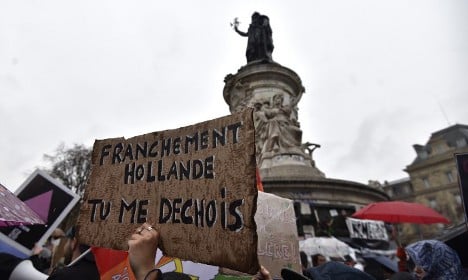“All that just for this!”
That was the recent front page headline in a French newspaper after President François Hollande and his government agreed to back down on planned labour reforms after weeks of debate.
The front page headlines in tomorrow’s main newspapers may well be similar after yet another climb down by Hollande, this time over his ill-judged plan to strip French-born terrorists of their nationality.
The president had taken politicians and rights groups by surprise when he announced, days after 130 people had been slaughtered in Paris, that he wanted to see French-born citizens stripped of their nationality and booted out of the country.
The reform was to be enshrined in the constitution along with the emergency powers that have seen police carry out thousands of raids, ban demonstrations and place hundreds under house arrest in the light of the November terror attacks.
But thankfully none of that will now happen after Hollande's U-turn, that comes after months of raucous debate, protests and political wrangling between the left and the right.

While the climb down is a relief, unfortunately Hollande’s motivation is more about trying to preserve the dying remains of his presidency rather than a realization he had been heading down the wrong path.
The Socialist president realized he didn’t have enough support to get the necessary backing of two fifths of lawmakers (senators and MPs) at a special Versailles Congress and so was left with no choice but to cave in.
An embarrassing defeat on the one theme where he has generally performed well on – responding to France’s two terror attacks – would have represented the nail in the coffin on his ever-decreasing chances of re-election in 2017.
Hollande will be criticized for yet another U-turn but his real mistake was pursuing the “cosmetic politics” in the first place. You have to wonder whether that too was for purely personal reasons.
Each time he has stepped into the role of France’s self-proclaimed war leader he has received a boost in opinion polls, which have repeatedly shown him to be France’s most unpopular president ever.
It seemed only a robust reaction to a terrorist attack and imposing a measure long supported by the far right gave him his best chance of winning over voters – many of whom have jumped ship to the far right.
Modelling himself as the president who was leading France to victory in a war declared by Isis terrorists might actually convince disenchanted voters to back him in 2017.
But what might have been the best for Hollande in post-terror attacks France clearly wouldn’t have been the best for a country where the Muslim population already feel marginalized and who would be forgiven for not championing the benefits of égalité and fraternité.
SEE ALSO: France has abandoned liberté, égalité and fraternité

France's own National Human Rights Commission (CNCDH) said the move was “radically opposed to all Republican values.”
“We know full well that this measure targets one group of the population, namely Muslims, and they will feel further stigmatized,” Patrick Baudouin, who is the honorary president of France's International Federation of Human Rights (FIDH) told The Local.
“A country should be able to handle its own nationals. What would become of the world if every country deported birth-right citizens considered undesirable? Should we imagine a landfill where they will all be put together?” said former Justice Minister Christiane Taubira, who resigned over the row.
What’s perhaps worse than the idea that the move may alienate a community France needs to have on board right now is that – and even supporters of the notion, including PM Manuel Valls agree on this – the reform would have proved utterly pointless in preventing further attacks.
The gunmen and suicide bombers who killed 130 in Paris proved they were willing to die on the spot and the threat of losing their French passports would not have dissuaded them from murdering innocent people.
On top of that, experts also argued the text of law would have been unworkable and would take years of costly court battles before someone is stripped of their citizenship and deported.
The plan to enshrine emergency powers in the constitution proved slightly more palatable to lawmakers of both sides, although UN experts, Amnesty International and European Right’s chiefs all lined up to blast France for “liberticide” (killing off freedoms).
While the population might have accepted a loss of certain freedoms as the price to pay for protection, the reality was that French police and intelligence services already had the powers they needed. And the risk again was that members of the Muslim population were being unfairly targeted and stigmatized.
In February the Collective Against Islamophobia in France (CCIF) says it has received 228 complaints since the emergency laws went into effect, including 57 related to house arrests.
In the end, the most damning indictment of Hollande’s push for the changes in the constitution is that it would probably have had Isis chiefs rubbing their hands in glee and waiting with open arms for new recruits from France.
Patrick Weil, France’s leading expert on the issue, was one of the most severe critics of the move and met with Hollande to try and convince him to drop it.
He simply said: “Hollande should be spending his energy trying to unite the country”.
After all the protests and debate it was clear that the president was doing exactly the opposite, but perhaps it's not too late before 2017.



 Please whitelist us to continue reading.
Please whitelist us to continue reading.
Member comments